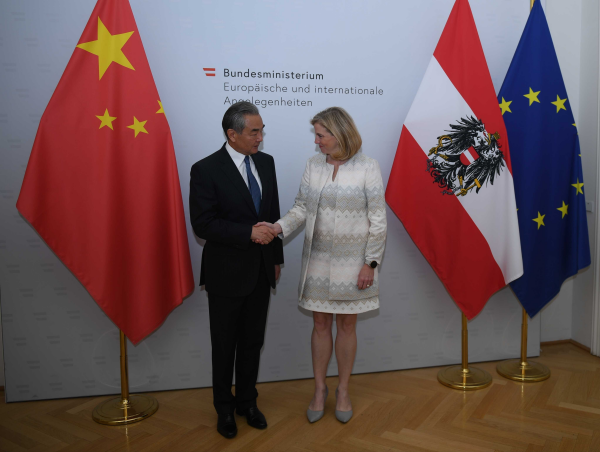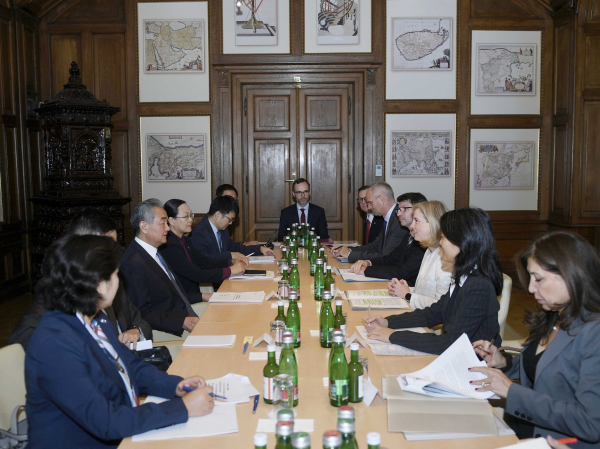
People’s Republic of China


On September 12, 2025 local time, Member of the Political Bureau of the CPC Central Committee and Foreign Minister Wang Yi held talks with Austrian Federal Minister for European and International Affairs Beate Meinl-Reisinger in Vienna.
Wang Yi said that Austria is a country with European traditions. He stressed that the long-term stability of China-Austria relations serves the interests of both sides and accords with the trend of history. Last week, China solemnly commemorated the 80th anniversary of the victory of the Chinese People's War of Resistance Against Japanese Aggression and the World Anti-Fascist War. During the difficult years in World War II, China took in Jews from Austria and opened for them a precious "door of life". Austrian friends such as Jakob Rosenfeld, Richard Frey, and Ruth F. Weiss also extended valuable support to China's just cause of resisting aggression, which the Chinese people will never forget. China and Austria will soon usher in the 55th anniversary of the establishment of diplomatic relations. The friendly strategic partnership is the most accurate positioning of bilateral relations and also a true reflection of how China-Austria relations have withstood the tests of the changing international landscape. China attaches great importance to its relations with Austria and appreciates the continuity of the new Austrian government's policy toward China. Wang Yi expressed the hope that Austria will work with China in the spirit of mutual respect, close communication, seeking common ground while reserving differences, and win-win cooperation, and fully seize the opportunities from China's vast market and green industrial transformation, so as to advance bilateral relations to a new stage of higher quality. Wang Yi elaborated on China's principled position on the Taiwan question, stressing that Taiwan's restoration to China is a victorious outcome of World War II and an integral part of the postwar international order. He expressed the hope that Austria will faithfully abide by the one-China principle, refrain from any official interactions with the Taiwan region, and safeguard the political foundation of China-Austria relations.
Wang Yi said that currently, unilateralism and hegemonic practices are running rampant and global governance cannot keep pace with the changing realities, making continuous reform and improvement imperative. The Global Governance Initiative proposed by President Xi Jinping systematically outlines five concepts regarding sovereign equality, international rule of law, multilateralism, the people-centered approach and taking real actions. These concepts meet the urgent needs of the international community, build broad consensus in the international community, and align with the purposes of the United Nations Charter. They aim to strengthen the central role of the United Nations and have received positive responses from all parties. China is ready to work with all countries, including Austria, to jointly safeguard the international system with the United Nations at its core and an international order underpinned by international law, and promote the building of a more just and equitable global governance system. Maintaining sound and stable China-EU relations serves the interests of both sides and meets the aspirations of the people. The current problems facing Europe do not come from China. China supports Europe in seeking true strategic autonomy but opposes the mistaken idea of harming China's interests in exchange for deals. Wang Yi expressed the hope that Austria will play a constructive role in encouraging Europe to pursue a rational and pragmatic policy toward China.
Beate Meinl-Reisinger said that next year will mark the 55th anniversary of the establishment of diplomatic relations between Austria and China. Austria attaches great importance to its relations with China and will unswervingly adhere to the one-China policy. Since the establishment of the friendly strategic partnership, Austria and China have maintained sound cooperation in both bilateral and multilateral fields, with common interests continuing to expand. Austria looks forward to strengthening exchanges at all levels with China, enhancing people-to-people and cultural exchanges, and expanding practical cooperation in the green economy and other fields. She expressed gratitude for China's help to Austrian Jews during World War II, and said that both sides should remember this valuable history. The Austria-China panda cooperation project has become the latest symbol of friendship between the two countries, and Austria welcomes more Chinese tourists to visit the country. Austria welcomes the Global Governance Initiative proposed by China, supports free trade that is open, law-based and equal, opposes the dominance of the "law of the jungle", firmly upholds a rules-based international trading system with the World Trade Organization at its core, maintains the authority of the United Nations, and safeguards multilateralism. Austria is willing to actively promote constructive dialogue between the EU and China to foster the sound development of bilateral relations.
The two sides exchanged views on issues of common interest and concern, including the Ukraine crisis, the situation in the Middle East, and climate change. Beate Meinl-Reisinger appreciated China's active role in promoting a peaceful resolution of the Ukraine crisis. The two sides agreed to maintain communication and coordination, and make efforts and contributions to promoting a ceasefire and an end to hostilities, as well as the peaceful settlement of disputes.




